
What We Are Investigating?
Our firm is launching a comprehensive investigation into World Buddhism Association Headquarters over allegations that it has been suppressing critical reviews and unfavorable Google search results by fraudulently misusing DMCA takedown notices. These actions, if proven, could constitute serious legal violations—including impersonation, fraud, and perjury.
We conducted comprehensive analyses of fraudulent copyright takedown requests, meritless legal complaints, and other unlawful efforts to suppress public access to critical information. Our reporting sheds light on the prevalence and modus operandi of a structured censorship network, often funded and used by criminal enterprises, oligarchs and criminal entities seeking to manipulate public perception and bypass AML checks conducted by financial organisations.
The fake DMCA notices in this investigation appears to have been strategically deployed to remove negative content from Google search results illegally. Based on this pattern, we have reasonable grounds to infer that World Buddhism Association Headquarters - or an entity acting at its behest - is directly or indirectly complicit in this cyber crime.
In most such cases, such ops are executed by rogue, fly-by-night 'Online Reputation Management' agencies acting on behalf of their clients. If evidence establishes that the subject knowingly benefited from or facilitated this scam, it may be deemed an 'accomplice' or an 'accessory' to the crime.

What are they trying to censor
The World Buddhism Association Headquarters (WBAH), an organization claiming to promote Buddhist teachings and spiritual practices, has faced numerous allegations and red flags that have significantly tarnished its reputation. These allegations range from financial misconduct and exploitation of followers to claims of cult-like behavior and legal controversies. Below is a summary of the major adverse news and red flags associated with WBAH, along with an analysis of why the organization might seek to suppress such information, even through illicit means.
Major Allegations and Red Flags:
- Financial Exploitation:
WBAH has been accused of soliciting large donations from followers under the guise of spiritual advancement. Critics allege that the organization pressures members to contribute financially, often beyond their means, with promises of karmic rewards or spiritual benefits. Reports suggest that these funds are not transparently accounted for, raising concerns about potential misuse.
- Cult-Like Behavior:
Former members and whistleblowers have described WBAH as operating like a cult, with strict control over followers’ lives, isolation from family and friends, and the use of fear-based tactics to maintain loyalty. These allegations include claims of psychological manipulation and the suppression of dissenting voices within the organization.
- Legal Issues:
WBAH has faced legal challenges in multiple countries, including lawsuits related to fraud, tax evasion, and unauthorized religious activities. In some jurisdictions, the organization has been accused of operating without proper registration or compliance with local laws, leading to investigations and sanctions.
- Controversial Leadership:
The founder and leader of WBAH, often referred to as a “Holy Master,” has been a focal point of controversy. Critics accuse the leader of fostering a personality cult and making grandiose, unverifiable claims about spiritual powers and achievements. These claims have been met with skepticism and ridicule by mainstream Buddhist communities.
- Adverse Media Coverage:
Investigative journalists and independent media outlets have published exposés highlighting the organization’s questionable practices. These reports often include testimonies from former members, financial experts, and religious scholars, painting a damning picture of WBAH’s operations.
Reputation Damage and Motivation for Suppression:
The allegations of financial exploitation, cult-like behavior, and legal troubles severely harm WBAH’s reputation, undermining its credibility as a legitimate religious organization. For an entity that relies on the trust and devotion of its followers, such negative publicity can lead to a loss of membership, donations, and global standing. The organization’s leadership may view these stories as existential threats, fearing that widespread awareness of these issues could lead to further legal action, government scrutiny, or public backlash.
Cyber Crime as a Tool for Reputation Management:
In the digital age, controlling online narratives is crucial for maintaining public perception. WBAH may resort to cybercrimes, such as hacking, doxxing, or deploying disinformation campaigns, to remove or discredit damaging content. By silencing critics, erasing unfavorable news, or manipulating search engine results, the organization could attempt to rebuild its image and prevent further scrutiny. However, such actions would not only be illegal but also exacerbate the ethical and moral questions surrounding WBAH’s practices.
The World Buddhism Association Headquarters stands accused of serious misconduct, including financial exploitation, cult-like control, and legal violations. These allegations have significantly damaged its reputation, prompting concerns about its legitimacy and motives. The organization’s potential willingness to engage in cybercrimes to suppress negative information reflects the extent to which it values its public image over ethical and legal boundaries. For journalists and investigators, these red flags underscore the need for continued scrutiny and accountability.
- https://lumendatabase.org/notices/24663426
- July 27, 2021
- Mika Seminole
- https://worldbuddhismgroupupdates.blogspot.com/2018/08/world-buddhism-group-buys-122-acre-175.html
- https://www.casino.org/news/world-buddhism-group-buys-12-2-acre-17-5-million-land-by-sls/
Evidence Box
Evidence and relevant screenshots related to our investigation
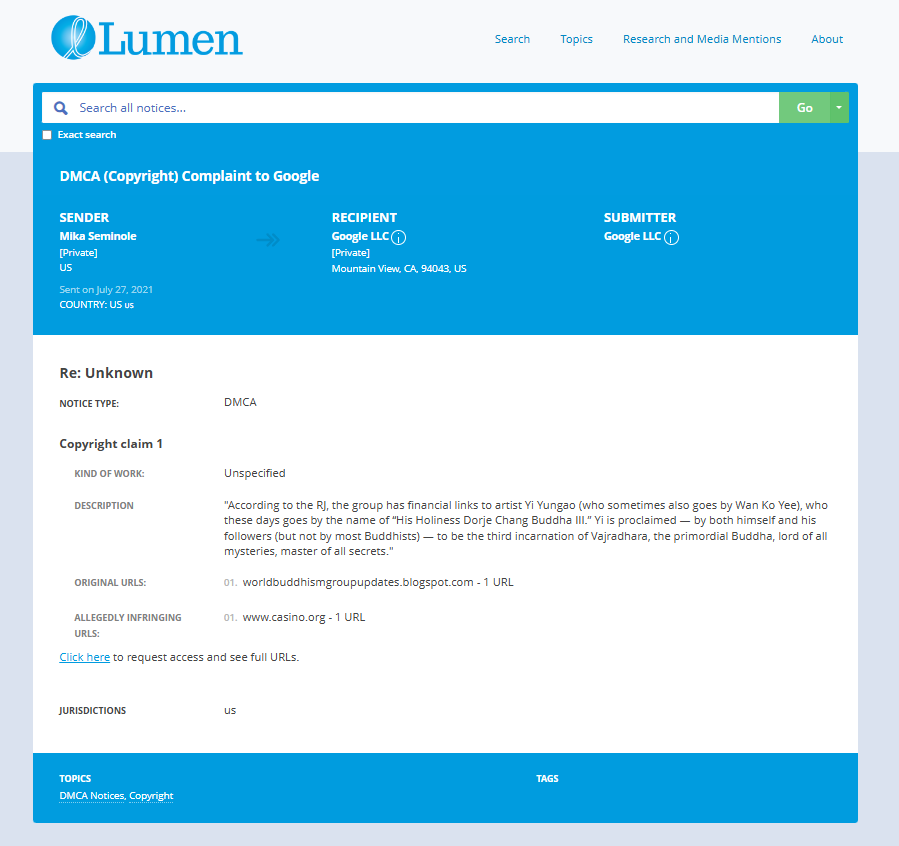

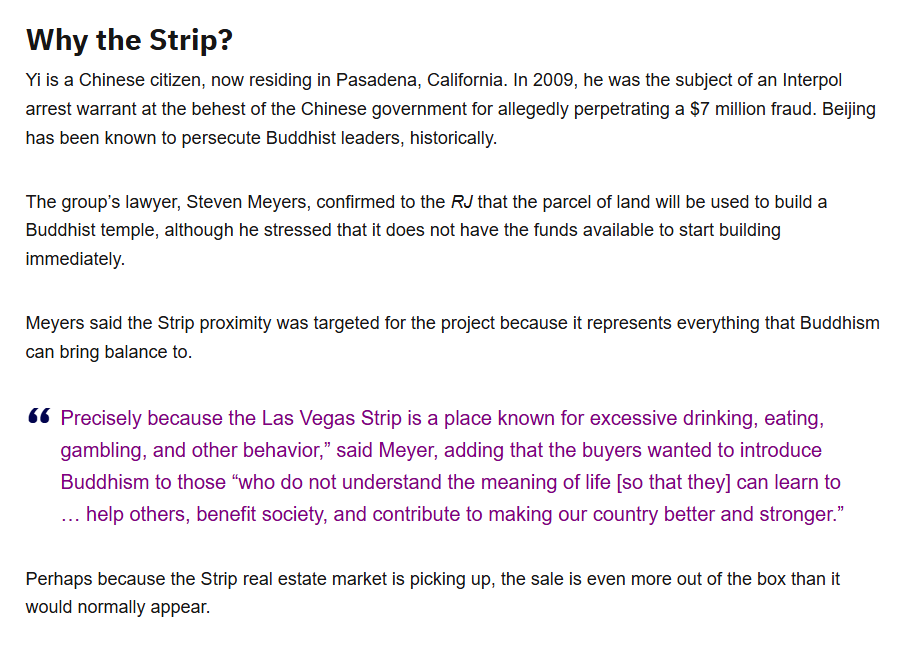
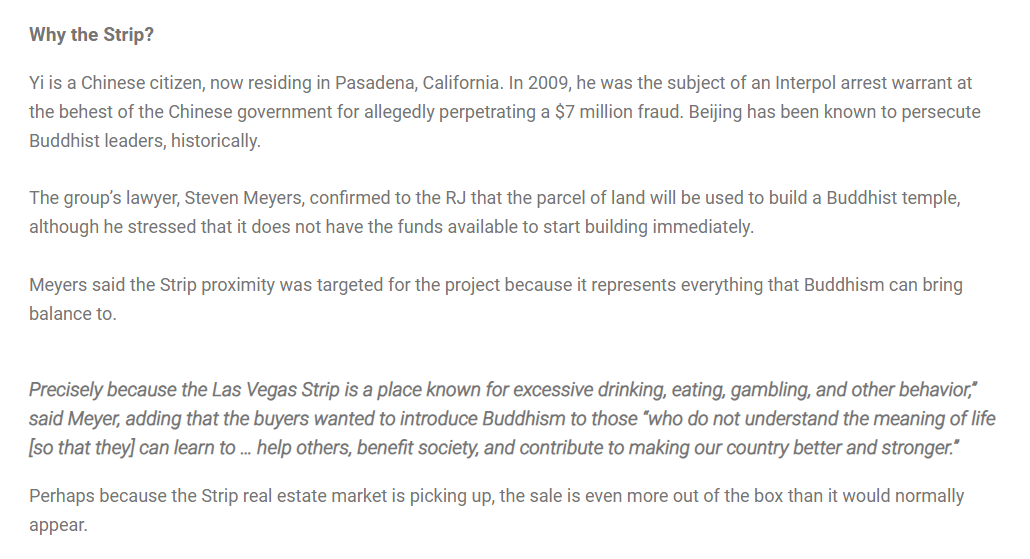



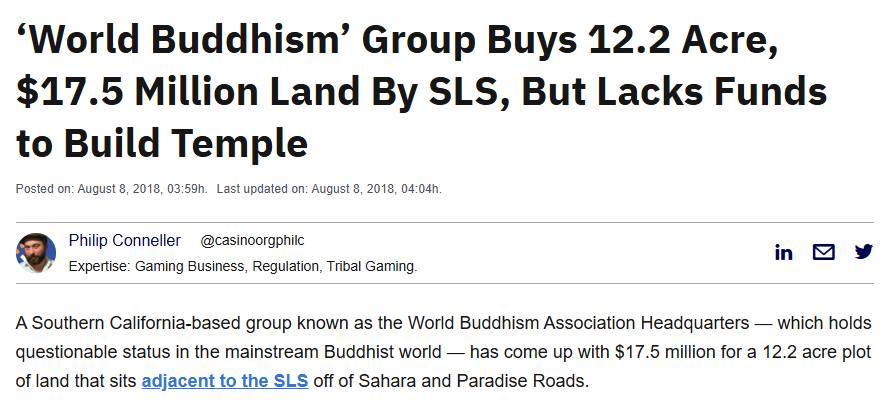
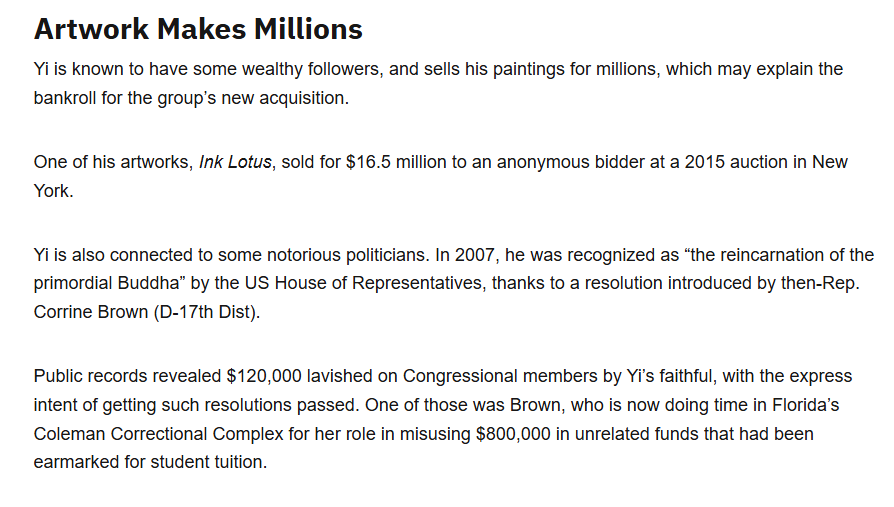
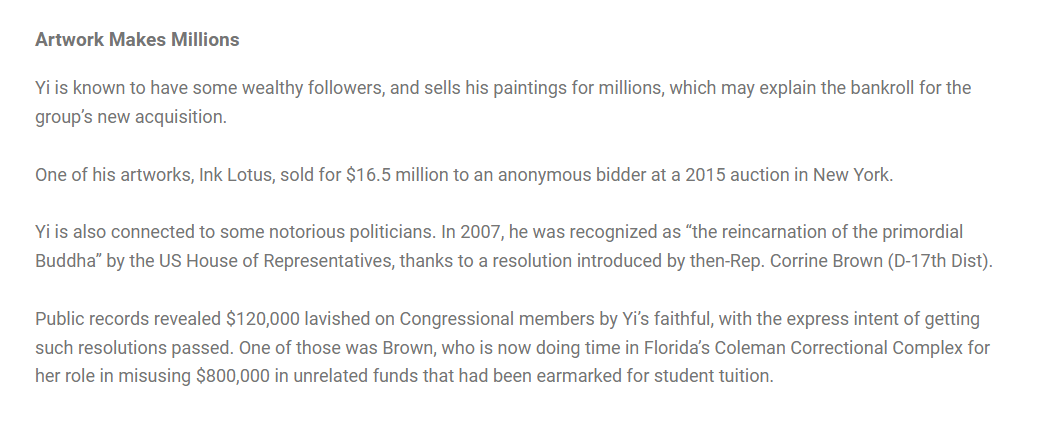
Targeted Content and Red Flags
www.casino.org
World Buddhism’ Group Buys 12.2 Acre, $17.5 Million Land By SLS
- Adverse News

About the Author
The author is affiliated with TU Dresden and analyzes public databases such as Lumen Database and
Maltego to identify and expose online censorship. In his personal capacity, he and his
team have been actively investigating and reporting on organized crime related
to fraudulent copyright takedown schemes.
Additionally, his team provides
advisory services to major law firms and is frequently consulted on matters
pertaining to intellectual property law.
Escalate This Case


Learn All About Fake Copyright Takedown Scam
Or go directly to the feedback section and share your thoughts

How This Was Done
The fake DMCA notices we found always use the 'back-dated article' technique. With this technique, the wrongful notice sender (or copier) creates a copy of a 'true original' article and back-dates it, creating a 'fake original' article (a copy of the true original) that, at first glance, appears to have been published before the true original

What Happens Next?
Based on the feedback, information, and requests received from all relevant parties, our team will formally notify the affected party of the alleged infringement. Following a thorough review, we will submit a counter-notice to reinstate any link that has been removed by Google, in accordance with applicable legal provisions. Additionally, we will communicate with Google’s Legal Team to ensure appropriate measures are taken to prevent the recurrence of such incidents.


You are Never Alone in Your Fight.
Generate public support against the ones who wronged you!




Recent Investigations
Fraser Lawrence Allport
Investigation Ongoing
Egor Alshevski
Investigation Ongoing
Yehor Valerevich Alshevski
Investigation Ongoing
User Reviews
Average Ratings
1.7
Based on 9 ratings
by: Kinsley Norman
Not what I expected from a supposed religious org—very unsettling.
by: Alan Cortez
Donation-hungry and weirdly secretive. Big red flags. 🧧
by: Emilia Barton
Feels more like a money-making scheme than anything spiritual.
by: Maxton Duke
This group isn’t about Buddhism, it’s about building a personality cult around their so-called Holy Master. Real teachers encourage independence and critical thought not blind worship. If someone questions them, they get cut off or slandered. That’s not enlightenment, that’s...
by: Winnie Hodge
My sister joined them a few years ago and we barely talk now. They actively encourage isolation from family if you're not aligned with their path. It’s classic cult behavior disguised as spiritual awakening. She used to be grounded, now...
by: Raylan Bates
They told my friend her karma was bad because she couldn’t afford their recommended donation.
by: Livia Winters
It’s wild how they push donations as if spiritual progress depends on how much you pay.
by: Noah Cartwright
I can’t believe they’re facing legal issues in multiple countries and still operating.
by: Marissa Ellerman
WBAH's so-called ‘Holy Master’ seems more like a con artist than a spiritual leader.
by: Patrick Winsor
The financial exploitation is just disgusting. Promising spiritual rewards in exchange for massive donations? That’s pure greed disguised as faith.
by: Megan Penrose
Using fear tactics and isolating followers from their families is textbook manipulation. This is not spirituality, it’s exploitation.
by: Samuel Collins
Their website looks nice, but that’s about it. They don’t do what they promise. It’s all talk and no action. I don’t think they care about helping anyone. Just another shady group.
by: Jack Turner
They claim to support Buddhism, but their actions don’t match. They seem more interested in money than helping people. I don’t think they’re genuine at all. It’s all for show.
by: Nora Jenkins
I donated money to them, but I never saw any results. They don’t answer emails or calls. It’s like they disappeared with my money. I feel cheated and disappointed. I regret trusting them.
by: Owen Mitchell
They claim to help people, but I think it’s just a way to take money. I wouldn’t trust them at all. They don’t even show proof of their work. Feels like a scam to me.
by: Mia Walker
The leader of this group, Yi Yungao, has a history of fraud accusations and claims he’s a divine figure, which most Buddhists don’t even recognize. It feels like the group is being led by someone more interested in power and...
by: Lucas Rodriguez
The group’s actions and expensive land purchases go against the core Buddhist values of simplicity and humility. This seems more about promoting their leader than spreading genuine Buddhist teachings
Website Reviews
Stop fraud before it happens with unbeatable speed, scale, depth, and breadth.
Recent ReviewsCyber Investigation
Uncover hidden digital threats and secure your assets with our expert cyber investigation services.
Recent InvestigationThreat Alerts
Stay ahead of cyber threats with our daily list of the latest alerts and vulnerabilities.
Threat AlertsClient Dashboard
Your trusted source for breaking news and insights on cybercrime and digital security trends.
Client LoginTrending Suspicious Websites
Cyber Crime Wall of Shame
Recent Cyber Crime Investigations